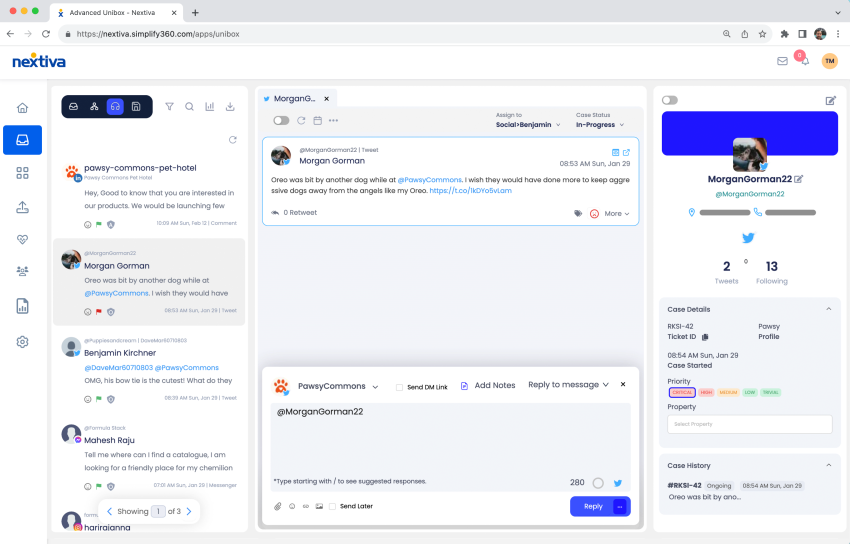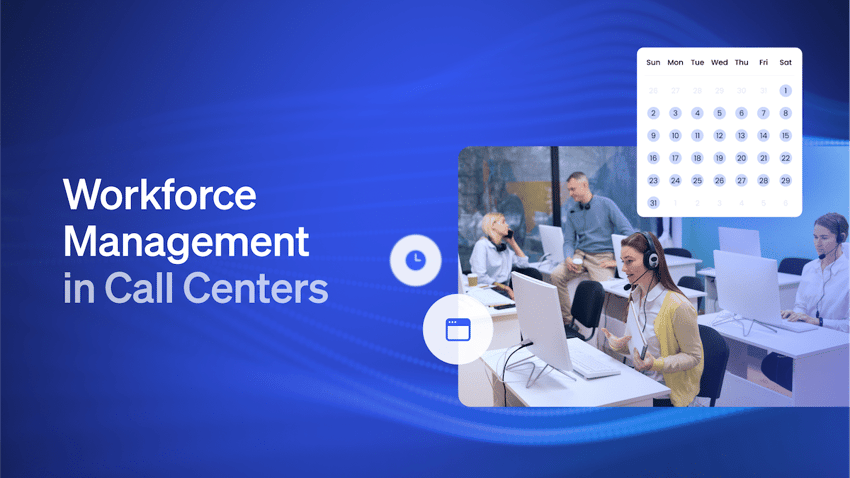Your customers already reach out through DMs, and they expect immediate responses. Juggling support requests across different social media platforms can lead to missed messages and public complaints.
According to Qualtrics’ report1, consumers are least satisfied with wait times, warning that slow response times are damaging hard-earned brand loyalty.
You need a unified inbox, not multiple tabs, to respond quickly and manage conversations without losing context. We analyze the leading platforms that support omnichannel workflows and automation. This guide presents the best solutions to turn your social support into a competitive advantage in 2026.
What Is Social Media Customer Service Software?
Social media customer service software is a specialized tool that centralizes and streamlines customer interactions across social media platforms to improve social customer engagement. It enables businesses to set up and scale their social media customer care programs.
The software brings together all customer requests, conversations, and brand mentions from channels like Facebook, Instagram, Threads, Bluesky, X (formerly Twitter), TikTok, WhatsApp, and others into a unified hub, simplifying communication and increasing customer engagement.
Instead of constantly switching between apps, your team gets a unified view of each customer’s social journey, making it easier to provide consistent, efficient, and personalized support.

Benefits of Using Social Media Customer Service Software
Social media customer support software offers more than the ability to respond to messages and online reviews. Here are some key benefits you get out of using social media customer service software:
- Respond faster: Enables your customer service teams to manage all social media messages, mentions, and reviews from a single inbox. AI tools for quick responses and automated workflows help agents handle inquiries more efficiently, reducing response times and offering greater social media customer service.
- Increase customer loyalty: Provide fast, personalized support and proactive engagement directly on social media. Strengthen customer relationships and loyalty, thereby increasing customer retention.
- Identify trends and issues: Use real-time monitoring and social listening to analyze sentiment, track customer data, and identify engagement patterns. Proactively address needs, prevent potential issues, and adapt your strategies based on valuable customer insights.
- Improve transparency: Get a complete overview of all customer interactions from a unified dashboard. Miss no comments, messages, or inquiries, and deeply understand your customer base and support performance.
- Boost your social media sales: Fast responses, improved engagement, and personalized support on social media not only build trust and brand loyalty but also directly impact your bottom line. By quickly identifying leads and upselling opportunities, you can effectively convert social interactions into sales.
Top Features of Social Customer Service Software
The right social media management platform provides businesses with customer service tools to handle interactions across multiple social media channels effectively. Here are a few valuable features to look for.
- Unified omnichannel dashboard: This central hub displays all your social customer interactions in one place. From a single view, you can quickly manage responses to Facebook messages, Instagram mentions, and online reviews without switching between different platforms.
- Social tagging: Categorize incoming messages with custom social tags based on topic, urgency, or product. This allows for better organization and faster routing to the right customer service agents or departments and optimizes reporting and analysis.
- Intelligent routing: Automatically route incoming customer queries or reviews to the best-suited agent or appropriate department to handle, based on expertise and availability. This ensures faster resolution times and improves productivity and efficiency.
- Performance monitoring: Real-time dashboards help management and stakeholders track metrics like response times, resolution rates, and customer satisfaction (CSAT) scores to identify areas for improvement and measure the impact of your customer service teams.
- Social listening: Using social listening tools helps you uncover brand mentions, industry trends, and customer sentiment across the social media landscape beyond just responding to messages. This allows you to proactively address potential issues, engage with customers in conversation threads, collect and implement customer feedback, and gain valuable customer insights.
- Advanced ticketing: An intelligent ticketing system streamlines your customer service workflows by converting social media requests into tickets, tracking their progress, and collaborating with team members for fast, accurate resolutions.
Top 10 Social Media Customer Service Platforms
Here’s a quick rundown of the best social customer service platforms. This high-level chart lists the features, starting price, and what it’s best for so you can compare.
| Software | Best for | Key feature | Price (billed annually) |
|---|---|---|---|
| Nextiva | Most businesses looking for an all-in-one omnichannel communication hub. | Unified dashboard with advanced social tagging, listening, and automation for efficient CX. | $15 per user/month (Core plan) |
| Sprout Social | Mid-sized businesses focused on complete social media management. | Social media publishing, conversation management, and robust analytics. | $199 per seat/month |
| Hootsuite | Scheduling and team collaboration for social media content. | Centralized dashboard for post scheduling, engagement, and AI-powered content drafting. | $99 per month (one user) |
| Salesforce Service Cloud | Large enterprises with existing Salesforce CRM infrastructure. | Extensive social media listening, monitoring, and seamless integration with Salesforce CRM. | $25 per user/month (Starter Suite) |
| Zendesk | Businesses looking for highly customizable customer experience solutions. | Zendesk AI for social media, omnichannel agent workspace, and unified ticketing system. | $19 per agent/month (Support Team) |
| Freshdesk | Small to mid-sized businesses prioritizing ease of use and quick setup. | Centralized social media management with automated workflows and advanced ticketing. | $0 per month (up to 10 agents, free plan) |
| Zoho Desk | Businesses needing strong integrations within the Zoho ecosystem. | Social monitoring, unlimited scheduled posts, and workflow automations for ticket management. | $7 per user/month (Express plan) |
| LiveAgent | Companies focused on omnichannel ticketing and gamified support. | Universal inbox for all customer inquiries, social media integrations, and productivity tools. | $15 per agent/month (Small plan) |
| HubSpot Service Hub | Businesses using marketing automation and a unified CRM. | Social Inbox for conversations, keyword monitoring, and lead tracking tied to a comprehensive CRM. | $15 per seat/month (Service Hub Starter) |
| Front | Teams prioritizing collaboration and a shared inbox experience. | Centralized inbox, omnichannel communication, and detailed customer history profiles. | $25 per seat/month (up to 10 seats, Starter) |
1. Nextiva
Best overall for all-in-one omnichannel communication.
Nextiva’s social media management platform integrates marketing, engagement, and customer support across various social media channels into one unified dashboard. It supports platforms like Facebook, Instagram, X (formerly Twitter), LinkedIn, and YouTube, with Pinterest coming soon.
Key features include scheduling and publishing posts, real-time interaction and engagement, and advanced analytics for monitoring social media performance. The platform also offers workflows and automation tools such as an all-in-one inbox, advanced filtering, social tagging, intelligent routing, performance monitoring, and competitor listening. These capabilities help streamline social media management, improve customer interactions, and enhance overall social media presence.
Features
- All-in-one omnichannel Inbox: View and manage incoming customer reviews in real time from various customer service channels in a unified interface.
- Social tagging and monitoring: Create custom tags to categorize reviews and track keywords across social channels for efficient search and analysis.
- Competitor and social listening: Track brand mentions, conversations, and competitor performance across social media platforms, forums, blogs, and custom sources to stay informed about customer sentiment, industry trends, and areas for improvement.
- Case automation and escalations: Ensure customers never fall through the cracks using automation to elevate issues to senior support reps and managers with complete visibility.
Pricing
Nextiva offers various packages for businesses of all sizes, ranging from standard plans for small businesses to custom plans with all the bells and whistles.
- Core: $15 per user per month, billed annually
- Engage: $25 per user per month, billed annually
- Power Suite CX: $75 per user per month, billed annually
 Pros
Pros
Easy to use
Reliable
Great customer support
 Cons
Cons
No integrations marketplace
Advanced features limited to the Enterprise plan
SMS isn’t in the basic plan
2. Sprout Social
Best for mid-sized businesses
Sprout Social provides a unified platform for managing cross-channel customer care on social media. Its centralized workspace puts customer interactions into a single dashboard, allowing agents to monitor and respond without switching interfaces. With tools for social listening, post management, automation, and sentiment analysis, Sprout Social helps businesses effectively engage with their audience and measure performance.
Features
- Social media publishing: Plan, organize, and deliver social content and campaigns with cross-network scheduling.
- Conversation management: Track campaign performance and identify, personalize, and respond to incoming direct messages (DMs).
- Reporting and analytics: Evaluate outcomes with access to social data and customizable reporting tools.
Pricing
Sprout Social features pricing for four different plans:
- Standard: $199 per seat per month, billed annually
- Professional: $299 per seat per month, billed annually
- Advanced: $399 per seat per month, billed annually
- Enterprise: Contact Sprout Social for a custom quote
 Pros
Pros
Free 30-day trial available
User-friendly interface
No contracts
 Cons
Cons
No free plan
High price
Steeper learning curve with advanced features
3. Hootsuite
Best for scheduling and collaboration
Hootsuite is a social media management platform offering a unified dashboard for scheduling posts, interacting with users, and analyzing performance across multiple platforms. Its centralized workspace and integration options allow businesses to connect their customer relationship management (CRM) systems, marketing tools, and other essential software. Hootsuite’s automation features enable scheduling posts, setting up automated responses, and auto-assigning messages to team members.
Features
- Centralized dashboard: Manage all your social media accounts from one central dashboard. This includes scheduling posts, responding to comments and messages, and tracking performance.
- Social media engagement: Respond to comments and messages from various platforms within the Hootsuite interface.
- AI-powered features: Hootsuite’s social media AI writer can help draft content and suggest hashtags.
Pricing
Hootsuite offers three plans: a one-person subscription, one for a team, and customizable enterprise options.
- Professional: $99 per month (one user), billed annually
- Team: $249 per month (three users), billed annually
- Enterprise: Contact Hootsuite for a custom quote
 Pros
Pros
Ease of use
Customer support
Inbox management
 Cons
Cons
Difficulty adding functionality
Lacks key features
Unable to tag on LinkedIn
4. Salesforce Service Cloud
Best for enterprises
Salesforce Service Cloud is a customer service solution that helps businesses manage social media. While Salesforce is primarily recognized for its sales CRM tool, Service Cloud offers omnichannel customer support capabilities that extend to social media channels. In addition to social media, Salesforce includes email, live chat, and self-service channels. It also provides add-ons like field service and AI tools, as well as seamless integration with Salesforce’s CRM for enhanced customer insights.
Features
- Social media listening and monitoring: This feature tracks brand mentions, industry conversations, and competitor activity across various social media platforms.
- Social media scheduling: This feature enables you to schedule and publish social media content directly from the Salesforce platform, streamlining your workflow.
- Social media analytics: This feature provides insights into the performance of your social media campaigns, including metrics like reach, engagement, and website traffic generated from social media.
Pricing
Salesforce offers a five-tier pricing structure with an add-on for AI chatbot Einstein. Here are the prices:
- Starter Suite: $25 per user per month, billed annually
- Pro Suite: $100 per user per month, billed annually
- Enterprise: $175 per user per month, billed annually
- Unlimited: $350 per user per month, billed annually
- Agentforce 1 Service: $550 per user per month, billed annually
 Pros
Pros
Integrates easily
Reliability
Customer support
 Cons
Cons
Difficult to customize support
Complicated to use to customize
Slow setup
5. Zendesk
Best for customizations
Zendesk is a customer experience platform that provides omnichannel support. Its ticketing systems help manage conversations across various channels, including social media, with options for basic email support on lower-cost plans and expanded support for phone and chat on higher-tier plans.
Zendesk AI helps make customer and employee experiences better by providing instant responses and streamlining workflows. Its analytics suite offers insights into response times and agent performance, enabling businesses to refine their strategies to deliver customer support.
Features
- Zendesk AI for social media: This service provides AI-powered features like chatbots for social media interactions, including troubleshooting, recommendations, and escalation to human agents.
- Omnichannel agent workspace: This integrates social media channels with other communication channels — like email, live chat, and social media — into a unified agent platform, providing a complete customer history.
- Unified ticketing system: Funnels all customer requests from various channels into one system for consistent response management.
Pricing
Zendesk offers five different pricing tiers for its customer service suite.
- Support Team: $19 per agent per month, billed annually
- Suite Team: $55 per agent per month, billed annually
- Suite Professional: $115 per agent per month, billed annually
- Suite Enterprise: $115 per agent per month, billed annually
 Pros
Pros
User-friendly interface
Service-level agreements
Customer support
 Cons
Cons
Cost
Complexity
Social listening challenges
6. Freshdesk
Best for ease of use
Social media customer service tools like Freshdesk streamline communication by allowing teams to manage high volumes of social media inquiries across multiple platforms in one place. Freshdesk features self-service options, automated workflows, advanced ticketing, and intelligent routing to streamline workflows. Additionally, Freshdesk’s analytics tools empower agents to resolve issues quickly and gain valuable insights.
Features
- Centralized social media management: Freshdesk allows businesses to integrate social media platforms like Facebook, LinkedIn, WhatsApp, Instagram, and X into a unified dashboard.
- Automated workflows: Features like automatic ticket creation for incoming social media messages and intelligent routing can streamline workflows.
- Advanced ticketing: Freshdesk converts social media interactions (comments, messages) into tickets within the platform.
Pricing
Freshdesk offers various packages, from free plans with limited features to enterprise plans with advanced features.
- Free: $0 per month (up to 10 agents), billed annually
- Growth: $15 per agent per month, billed annually
- Pro + AI Copilot: $78 per agent per month, billed annually
- Enterprise: $79 per agent per month, billed annually
 Pros
Pros
Ease of use
Canned responses
Ticket grouping
 Cons
Cons
Search functionality
Lag issues
Customization flexibility
7. Zoho Desk
Best for integrations
Zoho Desk is a help desk software with social monitoring tools. It can track brand mentions across social platforms like Facebook, X, and Instagram, centralizing communication for efficient ticket management. Capabilities include scheduling unlimited posts with a user-friendly content calendar, real-time engagement features, and basic analytics for insights into audience behavior and performance. Additionally, features like automatic ticket assignments, predefined response templates, and workflow automations streamline support processes.
Features
- Unlimited scheduled posts: Save time by scheduling social media content in advance for optimal reach and consistent posting.
- Social monitoring: Track brand mentions and customer conversations across social media platforms.
- Analytics: Track metrics like follower growth, engagement rates, and website traffic generated from social media.
Pricing
Zoho Desk offers affordable pricing tiers. Here are their options:
- Express: $7 per user per month, billed annually
- Standard: $14 per user per month, billed annually
- Professional: $23 per user per month, billed annually
- Enterprise: $40 per user month, billed annually
Zoho Desk also has a free plan for minimal support needs.
 Pros
Pros
Scheduled social media posts
Social media content calendar
Easy to customize
 Cons
Cons
Hashtag tracking
Competitor monitoring
Reporting and analytics
8. LiveAgent
Best for omnichannel ticketing
LiveAgent offers a unified customer support platform that consolidates email, calls, and social media communication into a single dashboard. Its gamification approach makes customer support engaging by rewarding teams for task completion. The platform integrates with social media channels like Facebook, Twitter, and Instagram, streamlining workflows with automated routing and responses. Additionally, LiveAgent provides valuable insights through robust reporting capabilities and supports team collaboration with integrations like Slack and WhatsApp.
Features
- Universal inbox: Centralizes all customer inquiries into a single platform for efficient management and omnichannel support.
- Social media integrations: Connects with popular social media platforms to convert messages and mentions into trackable support tickets automatically.
- Productivity tools: Templates and canned responses improve efficiency in social media communication.
Pricing
LiveAgent offers a tiered pricing structure with different plans catering to various business needs. Here’s a breakdown of their pricing.
- Small: $15 per agent per month, billed annually
- Medium: $29 per agent per month, billed annually
- Large: $49 per agent per month, billed annually
- Enterprise: $69 per agent per month, billed annually
 Pros
Pros
Easy-to-use interface
Affordable
Flexibility
 Cons
Cons
Not very intuitive for editing tickets
Too many features
Difficulty sorting through calls
9. HubSpot Service Hub
Best for marketing automation
HubSpot offers comprehensive social media customer service tools within its HubSpot Service Hub platform. Core functionalities include a Social Inbox for unified management of social media conversations, conversation management for direct response and resolution, and social monitoring to track brand mentions and industry discussions. Additional features include ticketing to convert social interactions into trackable tickets, reporting and analytics for performance insights, and automation for tasks like scheduling posts and pre-written responses.
Features
- Post scheduling: Plan and schedule your social media posts in advance so that you can publish them at the best times for your audience.
- Keyword monitoring: Alert your agents in real time when brand mentions (or other keywords) are used across social platforms.
- Lead tracking: Attribute business value to the leads and customers generated by your social media marketing.
Pricing
HubSpot offers different pricing models for businesses with varying needs and sizes. Depending on the plan you choose, HubSpot may require a one-time onboarding fee.
- Marketing Hub Starter: $15 per seat per month, billed annually
- Starter Customer Platform: $12 per seat per month, billed annually
- Service Hub Starter: $15 per seat per month, billed annually
- Service Hub Professional: $100 per seat per month, billed annually
- Service Hub Enterprise: $150 per seat per month, billed annually
HubSpot Service Hub also offers a free plan with limited tools for up to five users.
 Pros
Pros
Easy to use
Integrates well with other software
Robust features
 Cons
Cons
Cost and hidden fees
Limited automation
Difficult to modify templates
10. Front
Best for team collaboration
The social customer service platform from Front features a simple, user-friendly interface. Automated workflows handle routing and ticket handoff, ensuring fair workload distribution. It supports omnichannel communication across various channels, including social media, and empowers agents to provide personalized service through customer history profiles and in-app note-taking. Detailed analytics offer insights into response times, resolution rates, and team performance.
Features
- Centralized inbox: Manage all customer interactions in a single workspace.
- Omnichannel communication: Seamlessly switch between channels while maintaining context for the customer.
- Customer history profiles: Store past interactions with a customer, regardless of channel, for personalized responses and a more consistent customer experience.
Pricing
Front’s pricing plans come in four different packages.
- Starter: $25 per seat per month (up to 10 seats), billed annually
- Professional: $65 per seat per month (up to 10 seats), billed annually
- Enterprise: $105 per seat per month, billed annually
 Pros
Pros
Collaboration tools
Intuitive interface
Customization
 Cons
Cons
Limited reporting
Difficulty setting up complex workflows
Customer support
How To Choose the Best Social Media Customer Service Platform
Choosing the right platform is a strategic move. The software has to match your team’s abilities, your customers’ habits, and your business objectives. The best tool will feel natural for your agents and deliver clear value for your customers.
1) Start with an internal audit
Look at your customers, team, and goals before exploring tools. A clear picture of your priorities will help you avoid paying for features you never use. Why pay for a tool that supports 15 channels if your audience only uses two? Ask yourself these questions:
Who are your customers?
Identify your customers, then shortlist one or two social media channels your customers use most. Focus on tools that excel on those specific platforms. When you know where your audience spends time, you avoid overspending on unnecessary channels and reach them where they are.
What is your primary goal?
Set your main goal, such as reducing response times, generating leads, or monitoring brand reputation. Specific goals determine which features are important. For example, if reducing response time is the priority, automated routing and canned responses become critical.

Who is on your team?
Review your team setup by counting the number of agents who will use the software. Note their skills and comfort level with technology. A complex interface can slow adoption, while an intuitive tool keeps agents productive from day one.
What is your budget?
Plan for a realistic budget that covers onboarding, training, and future user seats. Look past the monthly subscription to avoid unexpected costs. Align your spending with both current needs and projected growth.
2) Define your must-have features
An internal audit should lead to a clear checklist. Rank features by importance so you know what is more important when comparing vendors.
- Make a list and mark features as critical or nice to have.
- A unified inbox is essential for small teams handling heavy message volume.
- Social listening tools are non-negotiable for brands focused on reputation.
- Look for automation, such as routing rules or canned responses, if speed is a top concern.
- Confirm whether the platform integrates with CRM, helpdesk, or email marketing systems.
3) Research, shortlist, and demo
Once your checklist is ready, move to research and testing. A demo will show how well the software supports your daily workflows.
Shortlist three or four platforms instead of exploring dozens. Check blog posts and read reviews on sites G2 or Capterra for unbiased insights. You can also ask colleagues or peers in your industry for recommendations.
The best option is to schedule demo scenarios based on real customer queries. Involve your support team in testing usability and speed. Their feedback will reveal usability gaps. Also, test common workflows like replying to a customer, escalating a ticket, or pulling a report.
How Nextiva Helps Social Media Teams
Your social media page is your new front door. It’s where customers share their excitement, voice their frustrations, and decide if they want to stick with you. Leaving them hanging in the comments or DMs is no longer an option.
The difference between a brand that thrives on social media and one that struggles isn’t just about posting great content but having great conversations. The right social customer service software is what bridges that gap. It equips your team to stop juggling a dozen chaotic tabs and start delivering the fast, personal, and helpful support that builds a loyal following and a stronger brand.
When you invest in the right platform, you build a more efficient team, create happier customers, and uncover sales opportunities you might otherwise miss.
If you’re ready to bring all your social conversations under one roof and turn your customer service into a competitive advantage, a reputation management platform like Nextiva is built for exactly that. It connects everything from social listening and automated ticketing to your core communication channels, giving your team the power to solve problems faster and smarter.

Manage online interactions, create brand loyalty.
Your go to customer service software is here to help. It’s Nextiva.
Social Media Customer Service FAQs
Here are answers to common questions about social media customer service.
The right customer service software and an effective social media strategy can significantly improve your business’s response times, boost agent efficiency, and provide insights into customer sentiment. They also help businesses build stronger customer relationships and enhance their brand reputation.
Social media is a powerful tool for small businesses to connect with customers. Customer service software can help them manage this effectively, even with limited resources. Many platforms offer affordable plans specifically designed for small businesses.
Here are a few examples of good customer service on social media:
* Responding to comments and messages promptly and professionally
* Taking ownership of customer issues and working towards resolutions
* Using a friendly and helpful tone in all interactions
* Going the extra mile to surprise and delight customers
The “best” social customer service software depends on your needs, budget, and business size. However, platforms like Nextiva, Sprout Social, and Socialpilot are highly rated for their unified communication features, scalability, and ability to centralize social interactions. Nextiva, in particular, offers an AI-powered, all-in-one platform suitable for businesses aiming for a robust, integrated communication strategy across all channels.
Several providers offer free plans for individuals or very small businesses just getting started. Providers like Freshdesk, Zoho Desk, and HubSpot Service Hub have free-forever tiers. These versions come with limitations, such as a cap on the number of users, fewer social media channels you can connect to, and a lack of advanced features like in-depth analytics, automation, and social listening. Free social customer service software is an excellent starting point for testing out a platform before committing to a paid plan that can scale with your business.
- https://www.qualtrics.com/articles/customer-experience/contact-center-trends ↩︎


















 Customer Experience
Customer Experience 










